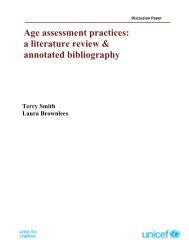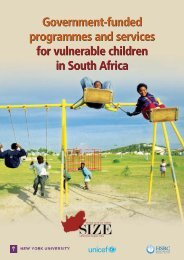Third and Fourth Periodic Report on CRC - Unicef
Third and Fourth Periodic Report on CRC - Unicef
Third and Fourth Periodic Report on CRC - Unicef
You also want an ePaper? Increase the reach of your titles
YUMPU automatically turns print PDFs into web optimized ePapers that Google loves.
<str<strong>on</strong>g>Third</str<strong>on</strong>g> <str<strong>on</strong>g>and</str<strong>on</strong>g> <str<strong>on</strong>g>Fourth</str<strong>on</strong>g> <str<strong>on</strong>g>Periodic</str<strong>on</strong>g> <str<strong>on</strong>g>Report</str<strong>on</strong>g><br />
33. (6) A pers<strong>on</strong> who has attained the age of 16 years <strong>on</strong> the date of commencement of the hearing of the charge shall<br />
not be tried for any offence by a Juvenile Court, but where in the course of any trial before a Juvenile Court the child or<br />
young pers<strong>on</strong> to whom the trial relates attains the age of 16 years, nothing in this subsecti<strong>on</strong> shall prevent the Juvenile<br />
Court, if it thinks fit, from proceeding with the trial <str<strong>on</strong>g>and</str<strong>on</strong>g> dealing with the child or young pers<strong>on</strong> in accordance with the<br />
provisi<strong>on</strong>s of this Act."<br />
In view of the internati<strong>on</strong>al covenants, declarati<strong>on</strong>s <str<strong>on</strong>g>and</str<strong>on</strong>g> other instruments, we feel inclined to the view that the relevant date<br />
must be the date <strong>on</strong> which the offence is committed, otherwise the whole thrust of the law to protect those who are immature,<br />
impetuous, unwary, impressi<strong>on</strong>able, young, fickle-minded <str<strong>on</strong>g>and</str<strong>on</strong>g> who do not know the c<strong>on</strong>sequences of their act, would be<br />
lost. It is the mental capacity of the offender at the time of committing the offence which is of crucial importance. It was<br />
observed in the case of Pratap Singh v. State of Jharkh<str<strong>on</strong>g>and</str<strong>on</strong>g> <str<strong>on</strong>g>and</str<strong>on</strong>g> another, 2005 (3) SCC 551 as follows:<br />
"Children Act was enacted to protect young children from the c<strong>on</strong>sequences of their criminal acts <strong>on</strong> the footing that their<br />
mind at that age could not be said to be mature for imputing mens rea as in the case of an adult. This being the<br />
intendment of the Act, a clear finding has to be recorded that the relevant date for applicability of the Act is the date <strong>on</strong><br />
which the offence takes place. It is quite possible that by the time the case comes up for trial, growing in age being an<br />
involuntary factor, the child may have ceased to be a child."<br />
Thus the Supreme Court of India settled the issue over-turning <strong>on</strong>e of their earlier decisi<strong>on</strong>s in the case of Arnit Das v. State<br />
of Bihar, 2000 (5) SCC 488. We may also add that the relevant laws of a vast majority of the countries looked at by us take<br />
the date of the offence to be the relevant date for applicability of the Act. In at least two decisi<strong>on</strong>s of our High Court Divisi<strong>on</strong>,<br />
Bablu (supra) <str<strong>on</strong>g>and</str<strong>on</strong>g> State vs Deputy Commissi<strong>on</strong>er, Satkhira (supra), the relevant date has been taken to be the date of<br />
occurrence, which we believe, with respect, is the correct approach. On the other h<str<strong>on</strong>g>and</str<strong>on</strong>g> there are many decisi<strong>on</strong>s of our<br />
superior courts holding the view that the relevant date is the date of framing charge or commencement of trial. In our humble<br />
<str<strong>on</strong>g>and</str<strong>on</strong>g> respectful view, this mis-interpretati<strong>on</strong> arose initially due to the inaptly applied wording of secti<strong>on</strong> 6(1) of the Act, which<br />
provides as follows:<br />
"6. No joint trial of child <str<strong>on</strong>g>and</str<strong>on</strong>g> adult.-(1) Notwithst<str<strong>on</strong>g>and</str<strong>on</strong>g>ing anything c<strong>on</strong>tained in secti<strong>on</strong> 239 of the Code or any other law<br />
for the time being in force, no child shall be charged with, or tried for any offence together with an adult."<br />
Dr. Malik submitted that this provisi<strong>on</strong> is c<strong>on</strong>cerned with the matter of separate trial for children <str<strong>on</strong>g>and</str<strong>on</strong>g> does not lay down the<br />
point in time at which the age will be relevant for the purpose of determining whether the accused is a child. We are inclined<br />
to agree with this submissi<strong>on</strong>, particularly in view of the stance taken by the Indian Supreme Court, bearing in mind the<br />
similar provisi<strong>on</strong> which exists in the (Indian) Juvenile Justice (Care <str<strong>on</strong>g>and</str<strong>on</strong>g> Protecti<strong>on</strong> of Children) Act,<br />
2000:<br />
"18. No joint proceeding of juvenile <str<strong>on</strong>g>and</str<strong>on</strong>g> pers<strong>on</strong> not a juvenile.-(1) Notwithst<str<strong>on</strong>g>and</str<strong>on</strong>g>ing anything c<strong>on</strong>tained in secti<strong>on</strong> 223<br />
of the Code of Criminal Procedure, 1973 (2 of 1974) or in any other law for the time being in force, no juvenile shall be<br />
charged with or for any offence together with a pers<strong>on</strong> who is not a juvenile."<br />
We have noted earlier that the Indian Supreme Court has decided that the relevant date is the date of commissi<strong>on</strong> of the<br />
offence <str<strong>on</strong>g>and</str<strong>on</strong>g> not the date of trial.<br />
The view taken by the courts in Australia can be gauged from the decisi<strong>on</strong> in Jas<strong>on</strong> Joseph Braun V R Eric Ebatarintja<br />
V R decided <strong>on</strong> 14 March 1997 by the Court of Criminal Appeal of The Northern Territory of Australia, (as reported in<br />
Australian- Northern Territory <str<strong>on</strong>g>Report</str<strong>on</strong>g>) where it was deliberated as follows:<br />
"Is the Court's jurisdicti<strong>on</strong> affected if the accused has "attained the age of 17 years" by the time be appears before it<br />
charged with offences he committed before he attained the age of 17? That questi<strong>on</strong> was squarely posed <str<strong>on</strong>g>and</str<strong>on</strong>g> answered<br />
by Muirhead J 11 years ago in Seears v Oldfield (1985) 36 NTR 65; his H<strong>on</strong>our said at 70: "Having c<strong>on</strong>sidered the matter<br />
<str<strong>on</strong>g>and</str<strong>on</strong>g> the authorities, I am satisfied that the age of the pers<strong>on</strong> charged when he or she committed the alleged offence is<br />
the critical test of the jurisdicti<strong>on</strong> of the Juvenile Court".<br />
154
















